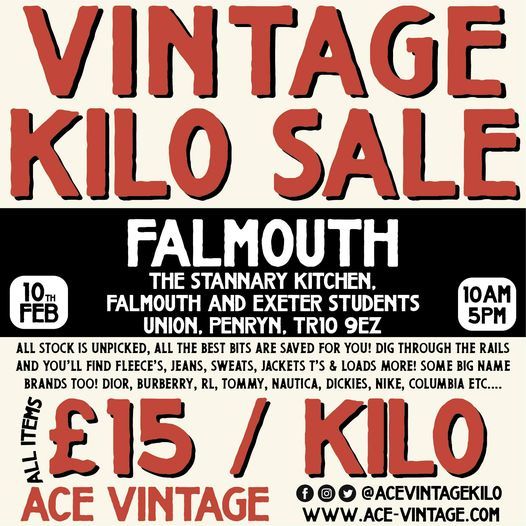Falmouth University students gathered on campus this Thursday for a vintage kilo sale, showing the importance of sustainable, affordable fashion.
Hosted by Ace Vintage, the event acted as a means for university students to afford quality vintage clothing, as well as highlighting the benefits of buying second-hand clothing and the necessity of sustainable fashion.
Sustainable fashion (sometimes called ethical fashion) is clothing extremely considerate of humanity and the environment, keeping negative impact on the latter to a medium. The opposite is fast fashion, an unethical and profit-driven way of making clothing – with no regards for the industry’s workers or the environment.
Organisations such as the non-profit ‘Labour Behind the Label’ have pioneered the spreading of this information with their ongoing campaigns in support of garment workers’ rights worldwide.
However, fast fashion continues to increase with its accessibility and affordability appealing to the youth. Between 2000 and 2015, clothing sales doubled from 100 to 200 billion units being sold per year, whereas the number of times an item of clothing is worn decreased significantly.
To combat this, more light has been shed on sustainable fashion’s importance recently, prompting events like vintage kilo sales, as well as protests, including the ‘Planet Over Profit’ fast fashion protest in Truro last month.
Speaking with Madeline Howard, co-fashion editor of The Falmouth Anchor, we asked questions about the future of sustainable fashion and an insight into ethical brands.
Talking about whether sustainable fashion will overtake fast fashion in years to come, Madeline says “I hope so, but I do think we need to take faster action and hold companies more accountable… the current issue is that a lot of sustainable companies and brands aren’t exactly accessible. Fast fashion is still winning but if we’re able to allow sustainable brands and fashion to be more accessible, I do think that fast fashion will slow, and sustainability will be the new way forward.”
The materials used in sustainable fashion are a lot more environmentally beneficial, with a lot of sustainable brands using vegan leather made from cacti, meaning synthetic materials aren’t as prominent and less animals are being in the process. “Companies such as Levi’s are using the same materials but greatly reducing their water consumption. It takes 1800 gallons of water to grow enough cotton to make a single pair of jeans. When you put that into perspective, that is a huge issue not just environmentally, but also impacts issues such as access to water in third world countries.”
It can sometimes be difficult to tell if a fashion brand is sustainable and ethical. Madeline says “that one can be tricky to find out. There’s an app called ‘Good for you’ which does their own investigations into brands and gives a breakdown of how ethical and sustainable a brand is. It is a consumer’s right to know where clothes have come from, and many brands make this info difficult to access […] doing research is so important when trying to understand a brand’s ethics and sustainability.”
The kilo sale being held at Falmouth University allowed for the event to appeal primarily to students. As well as being extremely accessible to the students, it also proved to be a big hit due to clothing not being individually priced, but instead decided on by the accumulated weight of the items. This is even more beneficial to students, as they are a group widely known to be troubled by limited financial freedom.
Andrew, an organiser of Ace Vintage, spoke about his passion for sustainable fashion and making it accessible and affordable for students.
Speaking about large companies that sell vintage clothing that are not easily affordable, Andrew said “There’s two kind of ends to it, there’s the big companies that wheel up in massive trucks and they do the city centres once a year, and then there’s the smaller companies that I think really target students.”
He says that it’s supposed to be “sustainable vintage fashion”, and is about finding hidden gems at affordable prices, “what you want to be able to do is find wonderful things, you know. We buy bails, we import from other countries […] and sometimes you find some amazing things, and we want the students to be able to get that.”
Ace Vintage are a vintage kilo sale company that host these events that are free for all to attend. Their clothing is sold at £15 per kilo, and they stock a variety of items from the 1960s to the present day.
You can find out more information about them at https://www.ace-vintage.com/, as well as the dates and locations of upcoming kilo sales.
WATCH! Truthfal reporter, Bobby Angelov, checked out what they had in store:



